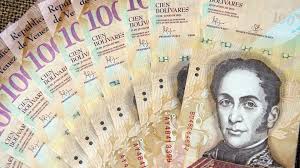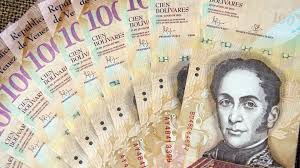
The largest economic disaster every in world history is being faced by Venezuela with prices going out of hand virtually every day.
According to a comment by the International Monetary Fund (IMF) on the country, the Latin American country is "stuck in a profound economic and social crisis" and the inflation would touch 1 million by the end of the year. the current situation in Venezuela was compared with the 1923 situation in Germany and the economic condition of Zimbabwe in the late 2000s by the IMF. Ion the previous two instances, prices had reached historically high levels resulting in dramatic social issues because of collapse in demand for money.
"Hyperinflation brings the economic system to a halt: It scares off foreign investors, discourages local business, destroys the value of savings and wages for households, thus damaging long-term economic growth," Francesco Filia, chief executive officer at the London-based fund Fasanara Capital, said.
"It makes serial defaults and capital controls inevitable. Once set in motion, it is very hard to stop, as the credibility of policymakers is badly damaged," he added.
But what happened to Venezuela, once one of the more important oil exporting nations of the world, that the country reached as a disastrous situation.
"Sadly, it is a long story of economic mismanagement," Zsolt Papp, emerging market debt investment specialist at J.P. Morgan Asset Management, said.
Venezuela had traditionally critically dependent on oil exports accounting for about 9i0 per cent of the total exports of the country at one point in time. It is believed to possess one of the largest proven oil reserves in the world. The situation changed when there was a collapse of global oil prices by as much as 50 per cent and the country was subjected to an acute shortage of cash reserves which started a round of economic challenges.
The official exchange rate was kept overvalued by Nicolas Maduro – who replaced Hugo Chavez in 2013, as a president of the country. He also exercised greater government control over access to U.S. dollars which meant that Venezuelans could face greater scrutiny if they attempted to exchange their national currency bolivars with dollars. This increased the volume of bolivars further and induced a reduction in imported goods. This resulted in increase of domestic prices and domestic inflation reaching record levels.
The policy direction taken by Maduro is mostly responsible for the economic problems in Venezuela. Maduro decided to mint more of the local currency bolivar instead of reducing spending – a measure that is traditionally unpopular with voters. This also added to the astronomical inflation rates.
The situation is aggravated by international sanctions being imposed on Venezuela – led by the United States which prohibited business dealings in new debt from the Venezuelan government and the state-controlled oil firm.
Last year, the economic problems of Venezuela resulted in the country missing on debt repayments to international investors which not only resulted in debt piles but also creates negative image of among investors and money managers about the economy.
"We need to see change in policymaking. Until we see a change in policy, it is difficult to see how the economy will turnaround," Papp said. He added that it is "very safe" to estimate that in the next few months, there would be no end to the Venezuelan crisis and it would probably take years.
"We expect the government to continue to run wide fiscal deficits financed entirely by an expansion in base money, which will continue to fuel an acceleration of inflation as money demand continues to collapse," the Fund said.
(Source:www.cnbc.com)
According to a comment by the International Monetary Fund (IMF) on the country, the Latin American country is "stuck in a profound economic and social crisis" and the inflation would touch 1 million by the end of the year. the current situation in Venezuela was compared with the 1923 situation in Germany and the economic condition of Zimbabwe in the late 2000s by the IMF. Ion the previous two instances, prices had reached historically high levels resulting in dramatic social issues because of collapse in demand for money.
"Hyperinflation brings the economic system to a halt: It scares off foreign investors, discourages local business, destroys the value of savings and wages for households, thus damaging long-term economic growth," Francesco Filia, chief executive officer at the London-based fund Fasanara Capital, said.
"It makes serial defaults and capital controls inevitable. Once set in motion, it is very hard to stop, as the credibility of policymakers is badly damaged," he added.
But what happened to Venezuela, once one of the more important oil exporting nations of the world, that the country reached as a disastrous situation.
"Sadly, it is a long story of economic mismanagement," Zsolt Papp, emerging market debt investment specialist at J.P. Morgan Asset Management, said.
Venezuela had traditionally critically dependent on oil exports accounting for about 9i0 per cent of the total exports of the country at one point in time. It is believed to possess one of the largest proven oil reserves in the world. The situation changed when there was a collapse of global oil prices by as much as 50 per cent and the country was subjected to an acute shortage of cash reserves which started a round of economic challenges.
The official exchange rate was kept overvalued by Nicolas Maduro – who replaced Hugo Chavez in 2013, as a president of the country. He also exercised greater government control over access to U.S. dollars which meant that Venezuelans could face greater scrutiny if they attempted to exchange their national currency bolivars with dollars. This increased the volume of bolivars further and induced a reduction in imported goods. This resulted in increase of domestic prices and domestic inflation reaching record levels.
The policy direction taken by Maduro is mostly responsible for the economic problems in Venezuela. Maduro decided to mint more of the local currency bolivar instead of reducing spending – a measure that is traditionally unpopular with voters. This also added to the astronomical inflation rates.
The situation is aggravated by international sanctions being imposed on Venezuela – led by the United States which prohibited business dealings in new debt from the Venezuelan government and the state-controlled oil firm.
Last year, the economic problems of Venezuela resulted in the country missing on debt repayments to international investors which not only resulted in debt piles but also creates negative image of among investors and money managers about the economy.
"We need to see change in policymaking. Until we see a change in policy, it is difficult to see how the economy will turnaround," Papp said. He added that it is "very safe" to estimate that in the next few months, there would be no end to the Venezuelan crisis and it would probably take years.
"We expect the government to continue to run wide fiscal deficits financed entirely by an expansion in base money, which will continue to fuel an acceleration of inflation as money demand continues to collapse," the Fund said.
(Source:www.cnbc.com)





